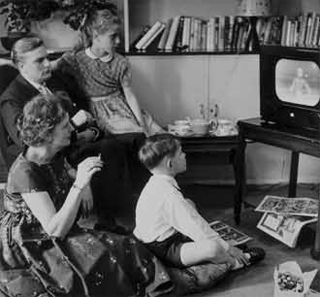
A Typical American Family Watching Television
I read books. But I also watch television, and plenty of it. To say that I actively monitor and follow 46 television shows during the usual Fall to Spring television season would be no hyperbole. Forty-six! Do you know how much of that can be classified as hour-long? Seventy percent!! I track shows broadcast on network TV, cable, pay channels, and specialty package cable! So when it comes to having a finger on the pulse of America and a hand in a bag of Cool Ranch Doritos, let’s just say I’m the freaking best. And being the best means navigating the entertainment world with a sharp eye, keen button-pushing reflexes, and the stamina of a Golden Glove winner. Seriously, try keeping up with even 10 shows a season and you’ll realize how much work it really takes.
Anyway, some of these shows I watch live, so I can’t perform the now-classic DVR Commercial Skip Maneuver™. It’s like I’m watching TV in 1999, and I get to experience television commercials the way the sponsors intended. Quiz me about Five Dollar Footlongs, Biz Stain Fighter, and soda swilling Ursus maritimus, and I’ll have your head spinning with my lightning-fast recall of advertising factoids. One thing I’ve gleaned from my incredibly obnoxious intake of television is that ads can come off a little biased against one group or another. Sometimes it’s a gender bias, like the AXE Body Spray ads where they depict hot women as complete nymphomaniacs who have somehow contracted Group Rapemind™ when they detect some layabout wearing AXE. On the flip side, commercials for almost every household cleaner, banking service, frozen meal, and color printer feature a shlubby guy ignorant about something and his attractive, smart, and confident wife comes in and teaches him a lesson and reminds him who really wears the pants. Just imagine an ad with ten dudes ripping off a woman’s clothes because she smells nice, or imagine a husband talking down to his dolt of a wife who didn’t know one doesn’t have to make appointments at Jiffy Lube. There would be rioting in the streets! Bias, and sometimes even extreme prejudice, can seep into the media messages.
Let’s not forget that famous 1997 vacuum cleaner spot where the one guy calls the other guy a faggot in front of his mother. By today’s standards, it’s hard to believe that ran for 6 months and won a CLIO.
Another thing I’ve noticed while giving in to my disturbing habit is that all diabetes medication commercials are extremely biased against people without diabetes. None of these ads talk about how the medication could affect individuals who have no need for it, which makes it feel like only certain people are targeted in these ads. Some spots talk about how you can get free blood sugar testers if you have diabetes and are on Medicare. What about the folks who don’t have diabetes, you say? Is there an avenue for them to get free testing equipment? You’d never hear about it in these commercials!
Of course, advertisers have certain demographics they want to reach. That’s why you normally won’t see Fruit By The Foot commercials during CSI: Miami and you won’t often see Cialis spots during reruns of iCarly. However, diabetes affects nearly 1 in 10 Americans, plus the 1 in 6 who are basically pre-diabetic, so I think everyone has a stake in folks getting all the facts. Something must be done against these biased commercials. You might say that if I don’t like the commercials, then I can turn the channel or not patronize the companies, but that sounds defeatist.
 The truth is racism in America isn’t going anywhere. In fact, it’s only growing and there is nothing we can do to stop it. But one thing we can do is get the word out to make everyone understand there is bias in our diabetes advertisements. I think we can agree all Americans deserve to be addressed in the spots, not just the ones with the illness. Once everyone is on the same page, we can begin to move beyond the dark age of diabetes medication commercials. So let’s all do our part make this country great again so I can get back to the newest episode of Burn Notice.
The truth is racism in America isn’t going anywhere. In fact, it’s only growing and there is nothing we can do to stop it. But one thing we can do is get the word out to make everyone understand there is bias in our diabetes advertisements. I think we can agree all Americans deserve to be addressed in the spots, not just the ones with the illness. Once everyone is on the same page, we can begin to move beyond the dark age of diabetes medication commercials. So let’s all do our part make this country great again so I can get back to the newest episode of Burn Notice.